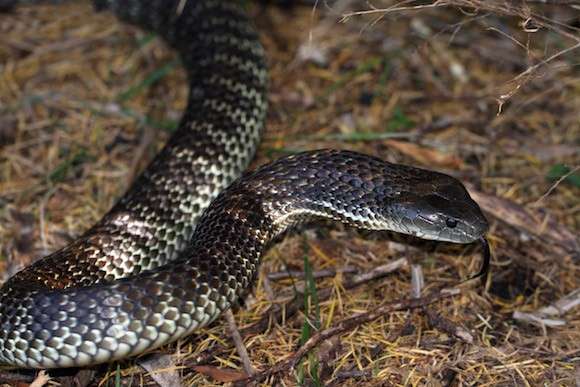Snake danger on the rise

With summer on the way, pet owners are being warned not to let their dogs or cats become one of the estimated thousands of snakebite statistics recorded in Australia each year.
Dr Mark Davis says although the start of spring has been mild, there have already been three cases of snakebite treated at the University of Melbourne U-Vet Hospital in Werribee.
And Dr Davis expects dozens more.
"Snake bites are becoming more common as we increasingly have housing encroach on their natural habitat," Dr Davis said.
"We've got growing populations and the snakes are still around, so we've got a lot more interaction. I think the numbers of bites are slightly increasing year by year."
The University of Melbourne U-Vet Hospital in Werribee sees an average of 50 to 75 cases each snake season, with dogs and cats bitten in equal numbers.
"It's in their nature to go hunting for prey, including snakes – especially some breeds, then they get into a bit of a stoush," Dr Davis said.
"It depends on who's quickest who lives."
It can often be difficult for owners to tell if their pets have been bitten, given bite marks are often indistinguishable.
Owners should look out for symptoms such as vomiting, dilated pupils, paralysis or difficulties moving.
New Zealander Kathryn Jenkins – herself a vet – moved to Point Cook about 10 months ago with her family and "adventurous" seven-year-old Burmese, Nemo.
Recently, Nemo returned from his usual outdoors trek looking a little worse for wear.
"He had vomited a few times, but we didn't think much of this," she said.
"It wasn't until later that night that we saw he was a bit lethargic, had very large pupils – in bright light, which is not normal – and seemed a bit puffy in the face."
After consulting U-Vet staff by phone, she brought Nemo to the hospital where he tested positive to Tiger snake bite.
Tiger snakes, along with Brown snakes, are among the most common culprits when it comes to bites.
"I was feeling sick in my stomach and when he stopped crying halfway there (to the hospital) I thought he might have passed away, so it was a horrible drive in," Dr Jenkins said.
Three days in intensive care and two vials of anti-venom later and Nemo is back home and recovering.
Dr Davis believes more owners are signing up for pet insurance to guard against the ever-present danger of snakes – and the associated costs of treatment.
"They've realised that there is no Medicare for pets, so if their pet needs a trip to the hospital, they want to be prepared for that."
Snakebite remains a huge problem for Australians and their beloved pets. On average, almost 600 people go to hospital for treatment, while between two and four people die each year from snakebite.
While there are no statistics on the number of pets affected, Dr Davis says it would easily number in the thousands.
Leading toxicologist Ken Winkel, also with the University of Melbourne, agrees snakebites are becoming more prevalent.
"It's an enduring problem – even in urban areas," he said.
"The idea that you can't get an urban life-threatening snakebite is, simply, incorrect."
Symptoms to look for:
- Vomiting
- Sudden weakness or collapse
- Seizures
- Dilated pupils
- Blood in the urine
- Rapid, shallow breathing
What to do:
- Seek emergency assistance immediately
- Keep pet as still as possible
- Do not try to locate or kill the snake
Preventative measures:
- Clear backyards of tall grass and rubbish piles
- Take care walking pets near waterways or bushy areas
- Keep pets indoors at dusk and at night if possible
Provided by University of Melbourne




















